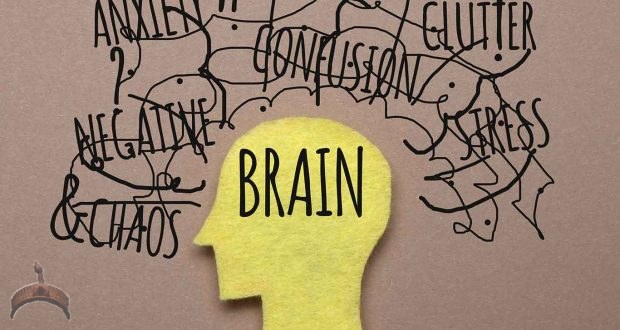It is neither scientifically, religiously or physical possible to separate human emotions from thoughts and reaction to events. Practically, we are made of hormones and enzymes which are capable of triggering not just physical responses, but also psychological reactions. As such, what we see, hear, smell can be transmitted into emotional responses through our mental processes.
Factually, everything that happens to us passes through and is processed by our brains. Nothing escapes the mental system. Even when we express actions by rote and which seems unconscious and reflex, it is still the brain that is at work. This position makes it the central point of all our being.
At least, now you will really understand why it is so important that we should look at how we can protect our mental stability and preserve balance. As can be seen, if something should go wrong with our central nervous system where the brain is the core, then our whole existence is highly threatened. Accordingly we should be concerned about how uncertainties and uncomfortable situations impact us.How are trials related to mental stability and balance?
From the foregoing, you will agree that no one can function properly without a brain and that it is their organ, that makes us function. Thus, since the brain records and processes difficult trials and throes, how do these affect it?
This article is not a medical one, so don’t expect to read any complex terminologies. So, I would simply highlight things that are quite common to us.Firstly, even before physical stress sets in, a whole lot of mental stress is being experienced. Stress on the brain from trials and throes can be so enormous and intense if not well managed. In a situation of stress, mental stability and balance are greatly challenged. If allowed to continue unchecked, it may result to acute and chronic mental disorder. It has been suggested that mental stress is far more intense and harmful than physical stress.
Secondly, trials and challenges make us to develop defensive mechanisms and management patterns which aim to check mate the uncomfortable nature of these happenings. With our brains in the state, there is high level of alert, unrest and apprehension. A constant operation of the flight or fright conditions. This leads us to overwork the brain which is always on the look out. With this, we are less stable and posses very little balance. A frantic disposition rids one of the calmness and serenity which aids the mental processes to go on smoothly.
Thirdly, when we are passing through difficulties and throes, favourable hormones and enzymes, which act as positive signals and indicators to the brain become decreased. This decreased supply of the feel-good hormones hamper the flow of information to and from the brain making the brain to function at a lower capacity and rate. An inhibited brain is a less stable and unbalanced brain. If this continues, one may slip into a state
Fourthly, being immersed in difficulties promotes feelings of inadequacy. A popular saying is that we are what we think. Thinking about our challenges constantly make us begin to feel we are not good even. As a rule, the way you feel is the way you act. This error message sent to the brain influences its direction of flow. As the thoughts are not good, the feelings can not be good and worse, the state of mind is impeded.
Furthermore, while in distress, facing diffulties and experiencing trials, we barely have time to cool off and rest. Without proper rest the brain cannot function properly. Over activity limits the time allocated to relaxation. Struggling to make ends meet or dealing with other types of stressors allow little time for personal care. Our mental health suffers when this happen and may lead to instability and imbalance. The brain needs to rest and recuperate. Brain cells rapidly die off when over worked. Depletion of gray matter invariably means poor mental health.
Everything we think about or that our brains process lead to the synthesis and flow of different kinds of hormones which result in expression of different emotions. That is, our brains through our thoughts, control how we react and respond to things.Though, in moderation, these reactions and conditioning can be positive and help us to function better and be more effective. However, excessive expression of these is totally unhealthy and will result in destructive patterns. In cases of low emotional intelligence, the subject, that is the person passing through these difficult times may be jolted and get completed disoriented. This can result in a couple of defective behaviours and tendencies.
In everything, balance is necessary to promote effectiveness and efficiency. A one sided life of always striving, struggling with negativities, without some level of relief, fun and excitement is obviously not a balanced life. No one in this state can boast of balance as his or her life is greatly tilted to one direction which is detrimental.Having considered the susceptibility of our mental health to prevailing adverse conditions, we need to decide whether we want to waste away with the barrage of life’s problems or whether we want to surmount these issues and live healthy, functional lives. If the latter is our goal, then we need to be more intentional about how we view difficulties and trials in life and then seek ways of preserving our mental stability and balance.
source:
https://flipmemes.com/2021/04/28/dangers-of-overthinking-on-our-mental-health/
 Ọmọ Oòduà Naija Gist | News From Nigeria | Entertainment gist Nigeria|Networking|News.. Visit for Nigeria breaking news , Nigerian Movies , Naija music , Jobs In Nigeria , Naija News , Nollywood, Gist and more
Ọmọ Oòduà Naija Gist | News From Nigeria | Entertainment gist Nigeria|Networking|News.. Visit for Nigeria breaking news , Nigerian Movies , Naija music , Jobs In Nigeria , Naija News , Nollywood, Gist and more









